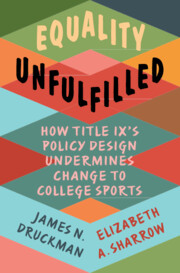‘Why, fifty years after the passage of Title IX, does gender equality remain elusive? Bringing rigorous analyses of multiple sources of original data into conversation with theories of political behavior, organizational culture, and political economy, James Druckman and Elizabeth Sharrow demonstrate persuasively the ways in which institutional factors such as sex segregation, organizational culture, and economic pressure interact with individual attitudes to normalize gendered hierarchies and anti-trans attitudes, suppress potentially powerful coalitions, and ultimately undermine the possibility of gender equality. They also, however, identify levers that provide possibilities for ways forward. The result is a crucial set of insights about both the limitations and possibilities of a key piece of American legislation.’
Dara Strolovitch - Yale University
‘Equality Unfulfilled is an absolutely needed social science intervention into debates about women’s sport. It provides a sobering picture of the stalled progress toward gender equality in US sport. The book offers not only policy ideas but detailed, research-oriented consideration of the obstacles these policies face and how they might be overcome.’
Jeremy Freese - Stanford University
‘Druckman and Sharrow deftly synthesize academic scholarship and real-world examples, shedding light on chasms between policies designed to promote equality and the lingering inequalities people experience within institutions and organizations. Focusing on the context of gender inequality in college sports, these authors highlight social and economic forces that all too often undermine efforts to promote equality, compelling readers to question why things are the way they are and to envision steps toward a more equitable future.’
Linda R. Tropp - University of Massachusetts Amherst
‘In this timely book, Druckman and Sharrow dismantle the cultural mythology that holds Title IX as an unqualified liberal feminist policy success. With impeccable research, theoretical sophistication, cogent analysis, and fluid clarity, they explain why gender equity remains unfulfilled in intercollegiate sport and suggest important possibilities for systemic change.’
Jaime Schultz - Penn State University
‘In Equality Unfulfilled, leading scholars James Druckman and Elizabeth Sharrow provide a comprehensive exploration of Title IX's impact on college sports. This thought-provoking book has broad implications beyond college sports and is an important read for understanding how to design effective policies and institutions that can combat the marginalization of underrepresented groups.’
Joshua Kalla - Yale University
‘Title IX is more than half a century old. While American collegiate women enjoy more opportunities than ever before to be high-level athletes, why isn’t there more equality yet? Druckman and Sharrow explain the stubborn nature of inequality by considering institutions and policy design and by hearing the voices of the people who make up the system: players, coaches, administrators, and fans. This compelling book is a must read for fans of women’s sports but also for anyone who wants to understand how, when, and why equality policies fail to achieve their goals.’
Julie Novkov - University at Albany, SUNY
‘Equality Unfulfilled is an invaluable resource for scholars, educators, policymakers, and anyone passionate about equality, particularly in college athletics. Druckman and Sharrow present a thought-provoking exploration of why Title IX has not realized its promise of removing sex-based inequalities, as well as a critical reflection on how to design policy and institutions to achieve greater equity.’
Cecilia Hyunjung Mo - University of California, Berkely
‘‘Equality Unfulfilled’’s creative use of college sports as a case study of gender inequality makes the book’s argument applicable to a variety of audiences, including former collegiate student-athletes like myself who rarely see our experiences reflected in academic work. ‘Equality Unfulfilled’ is informative and approachable to a variety of readers: fans of more mainstream work from sports journalists like Lindsay Crouse; scholars interested in representation, equality, and leadership; and student-athletes, families, and coaches who want to be, raise, and hone a new generation of women leaders.’
Quinn M. Bornstein
Source: Journal of Race, Ethnicity, and Politics



